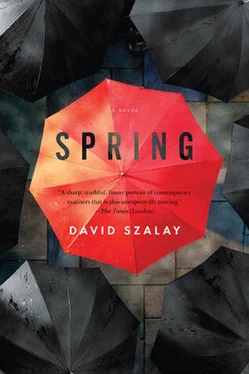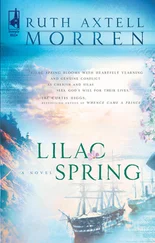No explanation of Isabel’s presence was immediately forthcoming. Over lunch there was at first small talk. How was James’s flight? (Fine—flights are always fine.) How was London? What was happening in the village? How much longer would the local shops hold out against the new Carrefour…
They were talking in a superficial way about Alexander’s work, something he was writing, when he and Isabel slipped into one of the intellectual play-fights they enjoyed so much. From then on Esmeralda said little, and James less. The question of the day was—Is the world changing more or less quickly than it was? Alexander said LESS quickly. The world was changing less quickly now than at any point in the twentieth century. Think, he said, of the fact that in 1900 there was no powered flight at all. The Wright brothers and their experiment on the sands at Kitty Hawk were still some years in the future. And not much more than half a century after that, there were supersonic airliners, spy planes photographing from the edge of space and men on the moon—while in the almost half a century since then we have essentially not moved past that point. We are still using, he exclaimed, as if it were an outrage, except that he was smiling, essentially the same equipment to fly around in as we were in 1970!
James smiled too, palely, when his father’s excited eyes met his own.
Then Isabel threw the Internet at him. Alexander waved that away. It was, he said, merely the latest step in the development of a technology that started with the telegraph (invented 1837), and then flowered into the telephone (1876). Electronic computers, the other necessary ingredient, were invented in the 1940s. What’s more, their period of exponential increase in speed and power seemed to be plateauing. This was his point, he said. Following an historically extraordinary period of invention from the mid-nineteenth century to the mid-twentieth, a sort of technological Russian spring, there was then a further period of working through the practical applications of many of these inventions, a period which in the last few decades had produced things like the Internet and the mobile phone. This period, he said, was now ending—that was his point. Fluently, initially marking them off on his fingers, he listed some of the inventions that had made the hundred years from 1850 to 1950 so extraordinary—the sewing machine, the fridge, the washing machine, the internal combustion engine, the typewriter (1867), the phonograph, the microphone, electric light, the pneumatic tyre, the zipper (1893), wireless communications, the submarine, the electron (1897—i.e. during the reign of Queen Victoria), the tape recorder (also a Victorian invention), television (1925), the jet engine, penicillin, nuclear weapons, the helicopter, the now ubiquitous electronic computer (1946), the transistor, the contraceptive pill—even, more than half a century ago now, the structure of DNA, which was obviously the fundamental step that has made all subsequent efforts in the life sciences possible. And that was hardly something new, it was hardly of our time. ‘Hardly,’ he said to James and Isabel, ‘of your time.’ (And then to Esmeralda, with a smile, ‘Or yours, my love.’) It was a discovery made the year that Stalin died. That was its era. His own era just about. (He was a man of the mid-century, a political journalist of Cold War years, witness of événements in Paris and anti-Vietnam protests in Grosvenor Square.) And since then, he stated provocatively, since the 1950s, there had not been a single invention on a par with the major items on his list.
In spite of the provocative tone in which he said this, Isabel seemed to have lost interest. She seemed to lack the energy to keep up her end of the debate. She just said, ‘Well, maybe,’ and—as if tidying it up—trimmed a sliver from the Pont l’Evêque with a silver knife. The awning flapped. Underneath the vigour of his speech, underneath the sense of excited engagement, his father seemed tired, James thought. His keen, mobile eyes were moist on the exposed terrace. His hair, still thick in his mid-seventies, was slightly unkempt. His hand, however, was steady as he poured the last of the wine, a Provençal rosé. He was making an effort not to seem put out by their presence—that was perhaps what all this energetic talk was about. This did not necessarily mean that he was put out, only that he was worried that he might seem to be. This sort of thing James was used to. His father was not an easy man to interpret, in spite of the wary expressiveness of his hazel eyes.
Now he was saying that scientific, technological and social change had for a long time in themselves provided us with a sense of purpose, of progress—‘and this sense was definitive, in its way’. It was an important part of our self-definition as a society. It was what we were about. It was what we did. We progressed. (Think of avant-gardism in art, how seriously—on the model of scientific progress—that was once taken! All those ‘experiments’. Think of Marxism. Think of our fixation with the ‘modern’, with ‘modernity’.) All of which in turn profoundly shaped our sense of what time was—we thought of time as a vector of progress. The slow erosion of that idea would have all sorts of implications—political, social, ‘even spiritual’.
*
When they had finished lunch, Alexander said that he had to work for a few hours, and went down to his study, and for the first time since his arrival James found himself alone with his sister, in the long salon. The old house was not designed for those thunderheads sagging over the valley. There was something almost Romanesque about its spaces. It had a vaguely ecclesiastical atmosphere. The furniture, the objets, the knick-knacks, the paintings, the small windows punched through the formidable walls, with their seatlike wooden ledges… These were things so familiar that they did not normally notice them. Their father had owned the house—it was in one of those troubadour villages—since the Sixties. It had always been there.
Isabel was sitting very low on a sofa, looking through a wide, flat book.
‘How long are you staying?’ James said.
‘I don’t know, a few days.’
He did not ask her why she was there. There were, he had heard from Esmeralda when they were alone in the kitchen for a minute, ‘problems’. That is, problems with Steve. He was not sure what sort of problems exactly. Perching in one of the window nooks, he looked out at the wet olive trees, the miserable blue shape of the swimming pool. ‘How’re things?’ he said.
‘They’re okay.’
‘Yeah?’
They sat in silence for a minute. The pages of the book creaked as she turned them. Looking out the window, he heard the whisper of her hand smoothing the tissue paper that screened the plates.
‘Oh I like that one,’ she said.
‘Which?’ He stood up to look.
It was the sort of day, he thought, still standing there as she turned the page, when it would be nice to have a fire. Only a fire would be able to deal with the sad damp that, in this sort of weather, permeated the whole house.
Isabel looked up questioningly—he was still just standing there. ‘What?’ she said.
‘What’s up?’
‘What’s up?’ she echoed, as if she didn’t understand the question. ‘Nothing.’ And then, perhaps feeling that that wasn’t plausible—‘I don’t want to talk about it.’
‘Okay…’
‘I’m going downstairs for a bit,’ she said. It was a peculiarity of the old hillside house that the street entrance was on the top floor, so that what you would normally expect to find upstairs, you found downstairs.
Читать дальше












